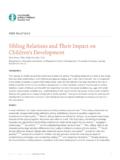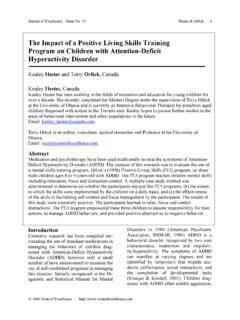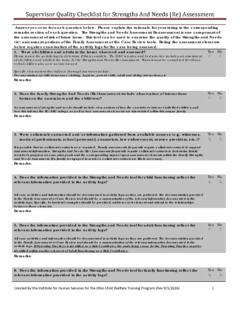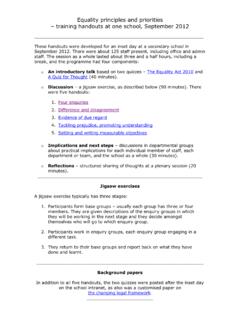Transcription of Every night you cry - Barnardo's
1 By Jane GloverEvery night you cryThe realities of having a parent in prisonOctober 2009 ForewordIn recent years the administrations of all four nations in the UK have paid considerable and welcome attention to children, and in particular to those who experience poverty and disadvantage. But one signifi cant group of children still remains invisible when it comes to support for them and their families. Children who have a parent in prison are more likely than others to experience poverty, mental ill health, poor housing and other negative outcomes, but are much less likely to receive any help or assistance. Although government policies refer to them as one of the groups of disadvantaged children who should receive attention, out of 208 local authorities and health boards across the UK, only 20 make any reference to this group in their children s plan.
2 It is in all our interests to ensure that these children get the support they need we know that children of prisoners are more likely themselves to go on to off end. As well as addressing their immediate needs, timely intervention can break this damaging WilsonDirector, Barnardo s Northern IrelandBackgroundAn estimated 160,000 children in the UK have a parent in This is more than twice the number of children in care and over six times the number of children on the child protection A lack of recording means that this number may be even higher and it is expected to rise as a consequence of sentencing reforms (in the Criminal Justice Act 2003) which have increased the use of custody and the length of prison responses to children and families of prisoners in each of the four UK nations are largely based on the fact that re-off ending rates fall if prisoners stay in contact with their Attention has tended to focus on how children can contribute to the prisoner s rehabilitation, rather than how they are coping, or whether their rights, as children, are upheld.
3 An estimated 45 per cent of prisoners lose touch with their is a strong association between parental imprisonment and adverse outcomes for children. The children of prisoners are about three times more at risk than their peers of committing antisocial or delinquent behaviour, Every night you cry2and more than twice as likely to have mental health problems during their life course6 Sixty-fi ve per cent of boys with a convicted parent go on to off These children undoubtedly constitute a group at risk . By failing to buff er the impact of parental imprisonment on children, we are failing to break the cycle not only of off ending behaviou, but of a whole spectrum of poor outcomes.
4 Nonetheless, children of prisoners are a hidden group. The Children of Offenders Review8 stated that we know very little about children of prisoners 9 and Tam Baillie, the new Scottish Commissioner for Children and Young People, agrees: The truth is we don t really know [how many]. The reason we don t know is we simply don t count them, and the reason we don t count them is because they are invisible. 10 The Social Care Institute of Excellence (SCIE) recently reviewed the literature11 and concluded that more research is needed on the experiences of children and young people with a parent in prison. In this report we capture the reality of parental imprisonment for the children and partners of 15 male prisoners in Bristol, England.
5 their voices remind us of the profound impact that parental imprisonment can have on a child s well-being and life chances. Barnardo s supports children and families aff ected by parental imprisonment through 21 services across all four UK nations. Our experience convinces us that providing support to the whole family is the best way of protecting and promoting positive outcomes for children who have a parent in prison. The work buff ering the impact of parental imprisonment will be discussed in the second of this series of briefi ngs, to be published in November methodologyBarnardo s identifi ed 15 women whose children have a father in prison, and who were willing to tell their story.
6 Eleven of their children (aged fi ve to 13 years old) also agreed to speak to us. All families were based in or around the Bristol area. The sample was recruited through visiting facilities and support projects at the diff erent prisons. Thirteen interviews took place in the family home and two were carried out by telephone. The researchers worked with some of the children in a separate room, but most of the discussions took place in an open room, with the mother or other family members present.** Eleven of the mothers identifi ed as white and three as mixed parentage . Information about ethnicity was unavailable for one family. Between them, the mothers had fi ve children who were disabled.
7 Eleven of the mothers lived with their partner immediately prior to his imprisonment; one saw the child s father Every day when he came to the family home to help with child care; one had little contact with the father but had been taking the children to visit him in prison. For the remaining two mothers, the relationship status was unclear. Every night you cry4 The realities of parental imprisonmentWhen a parent goes to prison, the eff ect on those left behind can be profound. The remaining parent may fi nd themselves facing added fi nancial pressures, living with the stigma of what has happened and learning to manage their own emotions while supporting their child through the loss of a parent.
8 Children themselves are not only aff ected by these changes, but face their own challenges such as supporting their parent, coping with bullying and reconciling confl icting emotions such as grief and anger. The voices of the parents and children that we spoke to are presented here alongside UK-wide evidence from a literature review carried out by Barnardo s in early 2009. The fi ndings are organised beneath the fi ve ECM outcomes. Achieving economic well-being?Imprisonment of a family member is often associated with the loss of a wage, a change to benefi t entitlements12 and additional costs, including childcare and travelling to visit the prisoner (in the UK, more than half of prisoners are held further than 50 miles awaay from home13).
9 Prisoners families are vulnerable to fi nancial instability, poverty, debt and potential housing disruption, and it is estimated that the average personal cost to the family and relatives of a prisoner is 175 per The Assisted Prison Visits Scheme (AVPS) allows reimbursement of travel costs in some cases, but many families remain unaware of the Cost is a big thing, petrol money and stuff . He was in Gloucester for two or three months, that was It used to be 15 in petrol, 4 to park and then just say 10 to go and get some canteen stuff in prison. Dinner on the way there Audit of children s plans (Barnardo s 2009)Barnardo s (2009) carried out an audit of children s plans across the four UK nations.
10 In England and Wales, 172 local authorities are required to publish children and young people s plans (CYPPs). In Scotland, each unitary authority is expected to publish an integrated children s services plan, and in Northern Ireland the strategy is outlined in the Northern Ireland children s services plan. In England, just 13 out of 150 CYPPs make reference to children of prisoners as a vulnerable group, and just fi ve of those outline a strategy to address their needs. Three of these receive government funding through the Families do matter initiative (see policy section of this briefi ng). In Wales, two out of 22 CYPPs specifi cally mentioned children of prisoners.















